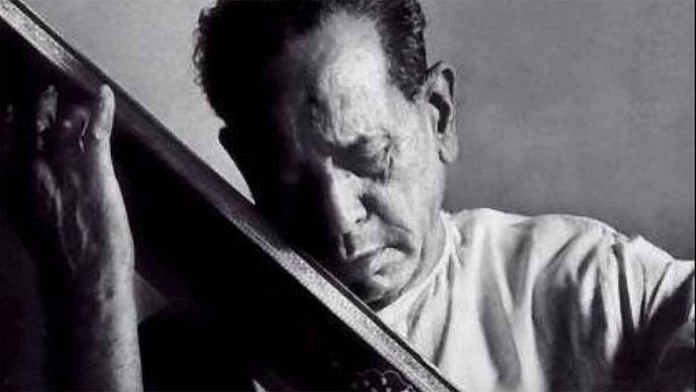
On the maestro’s eighth death anniversary, ThePrint takes a look at the legacy of India’s leading Khyal vocalist who also sang ‘Mile Sur Mera Tumhara’.
Pandit Bhimsen Joshi, the legendary exponent of Hindustani classical music, enthralled innumerable Indians with his music over seven decades.
Such was his legacy that he was conferred with the India’s highest civilian honour, the prestigious Bharat Ratna, in 2008 — he was the first Hindustani classical vocalist to be chosen for the award.
Younger readers may remember him as the singer of ‘Mile Sur Mera Tumhara’, but Bhimsen was one of India’s leading Khyal vocalists. He also created a unique vocal idiom of his own, excelling in different styles like gamakar, meend and tanakriya.
On the maestro’s eighth death anniversary, ThePrint takes a look at his invaluable legacy.
Initiation
Born on 4 February 1922, in Gadag, Karnataka, Bhimsen Joshi, the eldest of 16 siblings, was influenced by the music of Kirana gharana‘s Ustad Abdul Karim Khan from a very early age. Just 11 years old, Bhimsen ran away from home in search of a guru (teacher). He spent three years across north India in Lucknow, Gwalior and Rampur looking for a teacher.
His father was apprehensive initially about letting him pursue music, but agreed later on.
Bhimsen was known to follow processions accompanied by music bands when he was a young boy in Pune. He would eventually get tired and curl up and sleep somewhere. His parents would go looking for him, sometimes seeking police help. Fed up, Bhimsen’s father came up with a solution — he started writing “Joshi mastarara maga (son of teacher Joshi)” on Bhimsen’s shirts.
Also read: How Shiv Kumar Sharma, who turns 81 today, rocked Hindustani classical with ‘alien’ santoor
Musical career
Bhimsen took his initial musical training from Agasara Channappa, who was trained by veteran singer Inayat Khan. Channappa taught him Raga Bhairavi and Bhimpalasi. Joshi went on to learn various other styles and techniques from a number of teachers after that.
This was a major breakthrough for Bhimsen.
In 1936, the eminent Khyal singer Sawai Gandharva (Pandit Rambhan Kundgolkar) agreed to train Bhimsen. Sawai Gandharva introduced Bhimsen to the Kirana gharana and he went on to become one of its most famous proponents.
In 1941, Bhimsen gave his first live performance at the age of 19. He went on to record his first album the following year. The album, with devotional songs in Marathi and Hindi, was released by music label HMV.
Bhimsen was fluent in many common ragas like Yaman and Mian Ki Malhar but he also bravely picked others like “Lalit Bhatiyar, Durga, Abhogi, Shudh Kedar or Jai Jaiwanti”.
Bhimsen’s compositions and musical talent led to some melodious film songs like ‘Ketaki Gulab Juhi‘ with Manna Dey in Basant Bahar (1956), and ‘Raghubar Tumako Meri Laaj‘ and ‘Thumak Thumak Pag Dumak Kunj Madhu‘ for Amol Palekar’s Ankahee (1985) — he won the National Award for playback singing for the film.
Bhimsen also composed songs for a number of Marathi plays during the 1960s and gained much popularity for devotional songs composed by him during the ’70s.
His most popular rendition till date, however, is the song on Doordarshan from the ’80s- ‘Mile Sur Mera Tumhara‘.
Love for automobiles
Bhimsen loved automobiles.
“Had I not been a classical singer, I would have loved to spend my entire life in a garage fine-tuning a Fiat or a Maruti,” was reportedly his oft-repeated line.
On a journey from Mumbai to Pune once, Bhimsen regaled a taxi driver with his music. Oblivious to his popularity, the driver wondered if Bhimsen would know how to fix an engine in case of an emergency. To his surprise, Bhimsen helped the taxi driver fix the engine when the car later broke down in the middle of the journey.
Also read: Dilip Kumar Roy, the Cambridge-educated elite who added melody to India’s freedom movement
Awards
Before Bharat Ratna, Bhimsen Joshi was also awarded Padma Shri (1972), Sangeet Natak Akademi Award (1975), Padma Bhushan (1985), and Padma Vibhushan (1999), apart from other state awards.
In memory of his guru Sawai Gandharva, Bhimsen started an annual classical music festival in Pune in 1952. He last performed at this festival in 2007.

COMMENTS